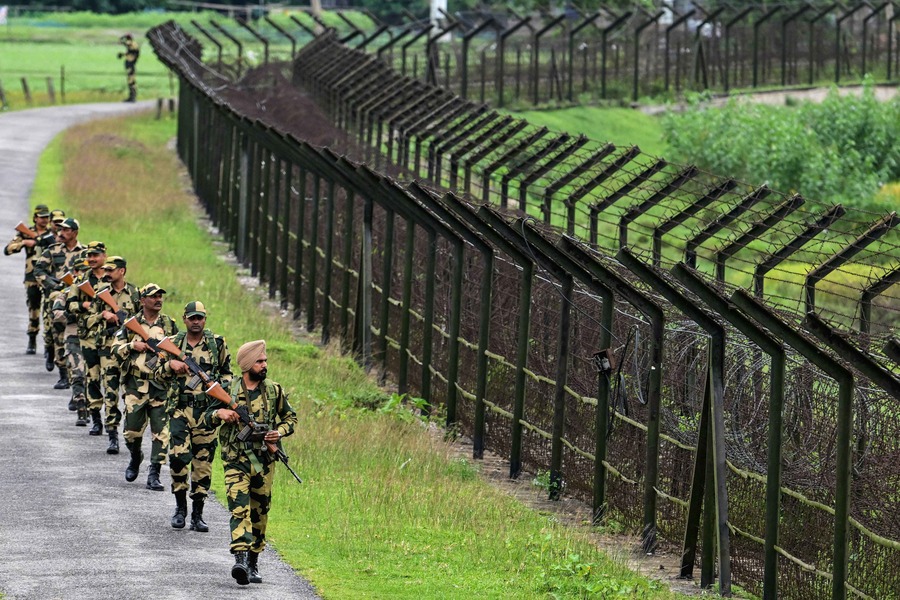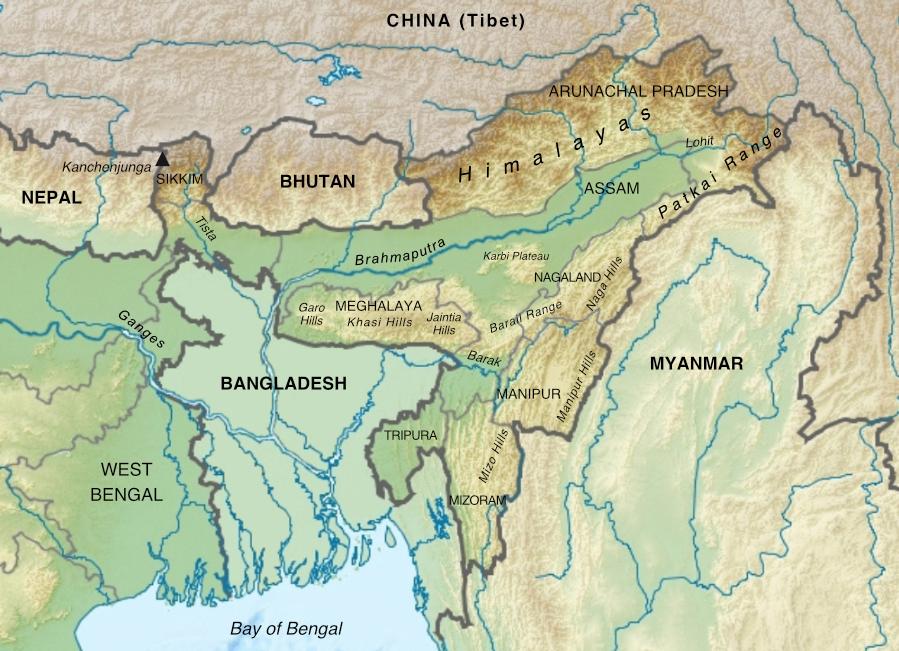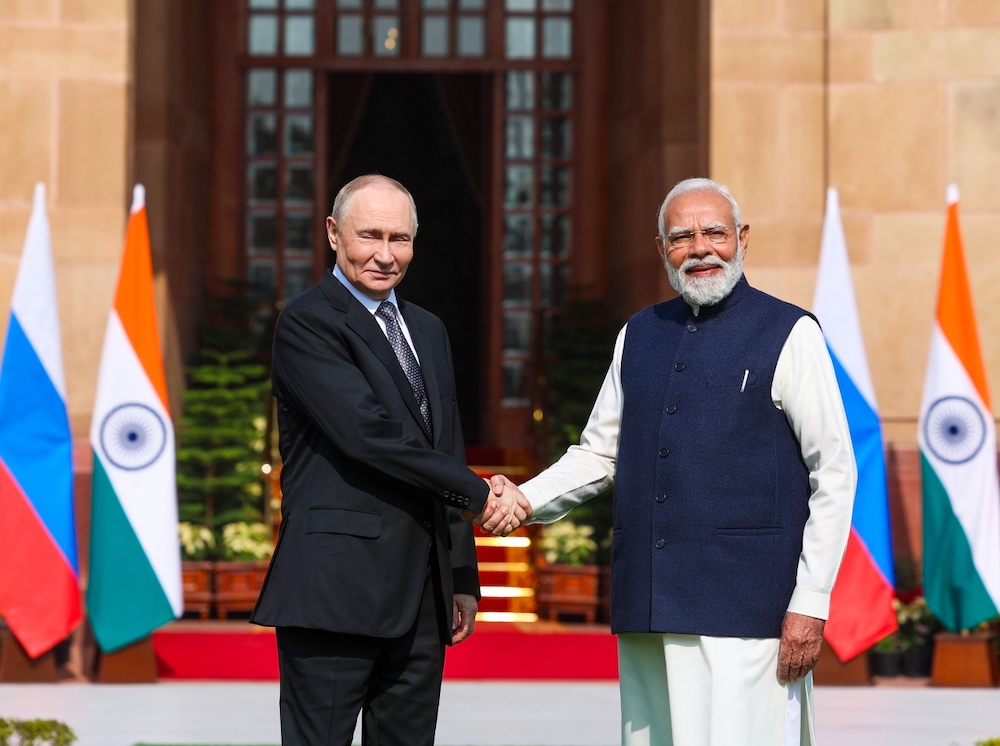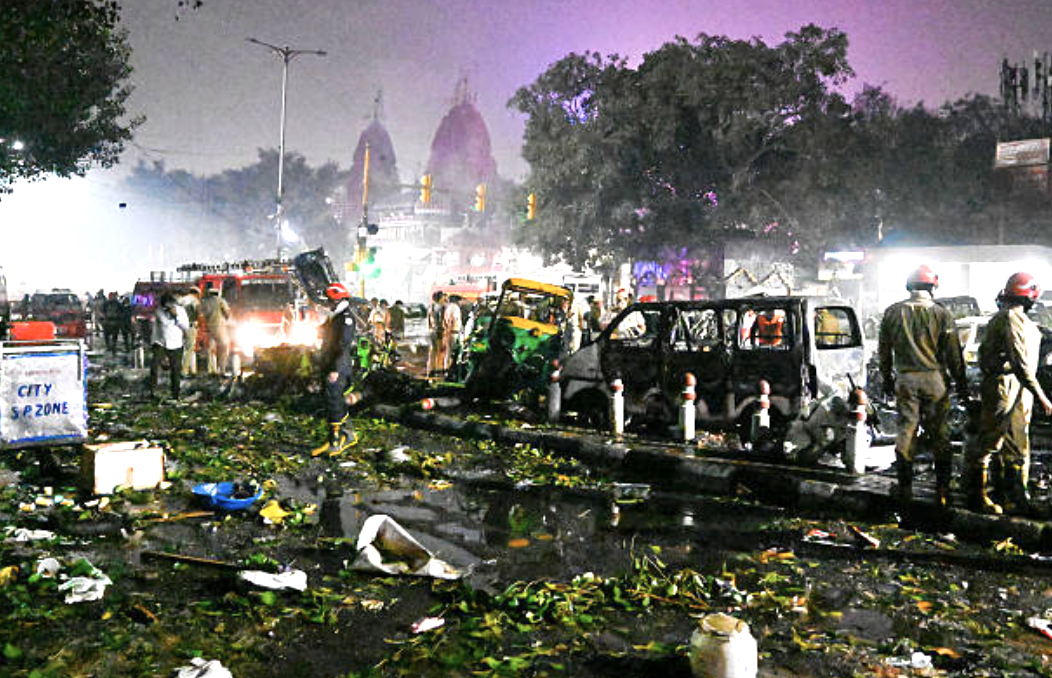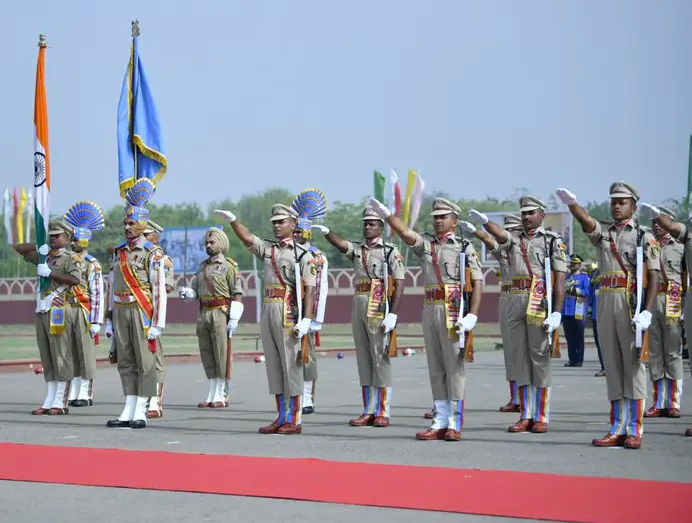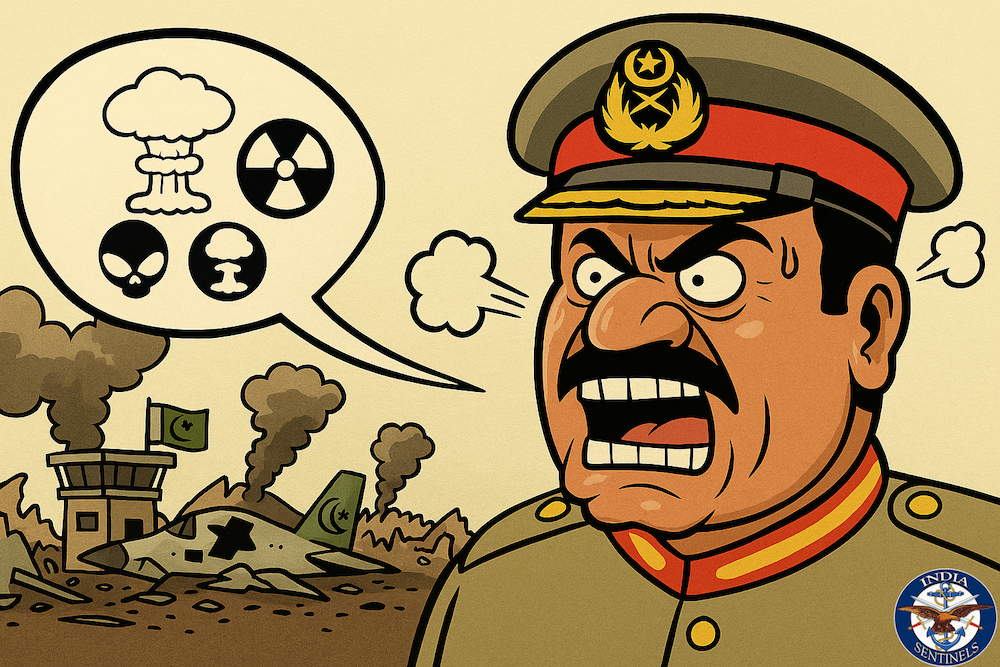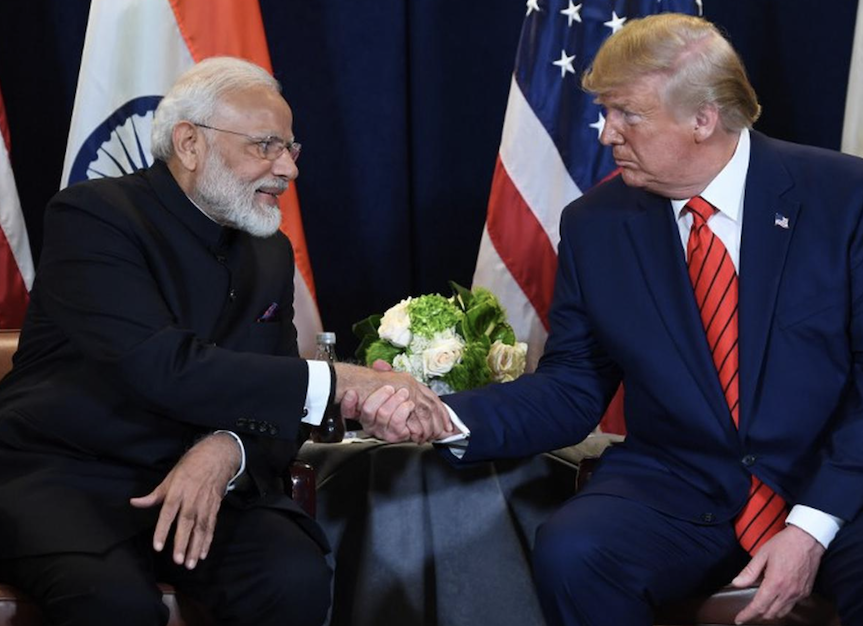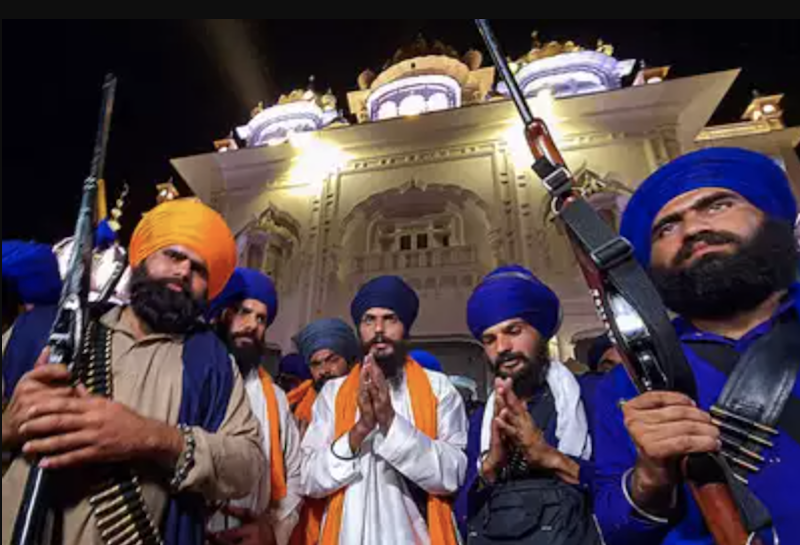 Amritpal Singh (C) with his supporters. (Photo: Twitter)
Amritpal Singh (C) with his supporters. (Photo: Twitter)
Last week, national newspaper and channel headlines screamed “Radicals storm Punjab police station, force cops to release accused.” Such news signals turbulence in Punjab, jeopardizing peace and stability in the whole state, including the border regions where the Border Security Force is fighting an undeclared war against cross-border syndicates involved in drugs and weapons smuggling through land and unmanned aerial platforms on a daily basis.
The sudden increase in drug smuggling from across the border and activities of radicals point towards collaboration between the smugglers and the radicals under the patronage of Pakistan’s Inter-Services Intelligence (ISI). Their handlers from across the border are setting the agenda for turbulence in Punjab, which should be a matter of grave concern for India. The situation in Punjab is no more a law-and-order problem but is a national security threat that needs to be handled accordingly.
Certain statements emanating from radical elements targeting prominent politicians and important government functionaries are a pointer to the state of security in the state. It poses an open challenge to the Union and state governments. There is also a tinge of confrontation between executive and constitutional heads of state, which also create an environment of indecision in bureaucracy and the security setup of the state.
Read also: Need collective will to stop revival of militancy in Punjab
Now, we are witnessing the effects of these indecision trickling down in the field and adversely impacting the security situation on the ground.
Punjab has the militancy-hit Union territory of Jammu & Kashmir to its north and the hostile Pakistan to the west. Pakistan, which is currently facing political instability and economic crisis, is on the verge of imploding, according to South Asia observers and experts. With the enhanced focus of the Union government being on J&K, there is a downward trend in terror-related incidents in the Union territory. However, it seems that finding things difficult in J&K, the strategists from across the border have also included Punjab in their anti-India agenda, which is now manifesting in the sudden turbulent spurt in the radical movement exploiting religious sentiments of people and deficiencies in governance in the state.
At first glance, the current situation gives the impression that Punjab is slowly inching towards the 1980s due to its internal turbulence.
The BSF is vigilant for impregnable border security and border management, but the Punjab Police seems to be helpless at this moment. Another probable cause of rise in radicalism is politics of religious polarization for reinforcing majoritarianism for vote-bank politics. It certainly creates a sense of insecurity among minorities, which is exploited by separatists and radicals to foment dissatisfaction among people in the name of region and religion. It gives fillip to separatism and is exploited by cross-border elements to pursue their anti-India agenda.
According to media reports, Amritpal Singh, the 30-year-old chief of a newly formed radical Sikh outfit called “Waris Punjab De” (which translates to “heirs of Punjab”), which rapidly gained prominence in the last year and half, said: “Our aim for Khalistan should not be seen as an evil and a taboo. It should be seen from an intellectual point of view as to what could be its geopolitical benefits. It’s an ideology – and ideology never dies. We are not asking for it from (New) Delhi.”
This statement should be a revelation to the Union and state governments considering the sensitive location of Punjab and security scenario in the border state.
Read also: Story of BSF’s key role, valour and sacrifices in 1971 India-Pakistan war
The deficiencies in governance and the inability to tackle high rates of unemployment, rising inflation, corruption, and poverty coupled with poor quality of education that coloured to suit certain political agenda have also been exploited by radical elements to rope in the youth into their fold. Unless the model of governance is overhauled to give a message of sincerity of effort to meet the aspirations of people at large and the youth in particular, there will be movements, like the Waris Punjab De has currently waged, to exploit such dissatisfaction to spread separatism fuelled by radical ideology to jeopardize the security of the country in general and the security of Punjab in particular because it is a frontline state with Pakistan.
So, what needs to be done to stop radicalization of society to stop the spread of separatist agenda? An impression is gaining ground that the security apparatus of state, that is the state police and intelligence agencies, are professionally unprepared and incapable to tackle a fresh separatist movement. Bhola Nath Sharma, former inspector general of the BSF, recently tweeted that the Punjab Police must get into its early 1990s’ mode of professionalism. He also said the police need the best of officers who can lead the force like Julio Francis Ribeiro or KPS Gill.
Punjab Police has to get itself into early 90 mode of professionalism. It needs best of the officers who can lead the police like JR or KPS. Time to act before any reconsolidation of fresh violence begins in the state. Question is how will police leadership handle this challenge!
— ?? BN Sharma, IG (Retd) (@BholaNath_BSF) February 23, 2023
The hard fact of the matter is that the situation in Punjab is more dangerous than a routine law-and-order problem. Charging at a police station ferociously and violently is an indicator of return of turbulence of the early 1980s, and it should worry the top police hierarchy.
The Punjab Police need restructuring in terms of training and organizational revamping to bring in professionals to man intelligence and operational posts to get real-time intelligence to plan operations professionally and ensure peace. This will inhibit and restrict the spread of radical and separatist movements. Basic and in-service training, including physical and weapons training, need to be given top priority to keep men physically and mentally fit. Emphasis should be put on every man under training in the yearly training cycle, including officers, irrespective of entry.
In this endeavour, the top-heavy police hierarchy needs to be trimmed to infuse efficiency and professionalism. At the top and middle level, the Union and state governments may consider posting officers from the central armed police forces (CAPFs), like the BSF, CRPF, and the ITBP to main posts of zonal inspectors general, range deputy inspectors general, and superintendents of police for operations.
The Union and state governments may also consider posting officers from the CAPFs to impart training to make men professionally prepared to take on challenges of radicalization and separatism. Training modules need modelling to achieve desired standard of individual proficiency to make the personnel individually and collectively professional team players.
Read also: Leadership of security forces is failing nation to control Maoists
As a prerequisite for professionalism, the stability of tenure for officers appointed at top of hierarchy is a must. Punjab has seen frequent change of director generals of police. In one year or so, there have been five DGPs, each having an average tenure of just over two months. Certainly, when there is instability and uncertainty at top, there will be uncertainty at all levels of hierarchy, which in turn will affect the operational and administrative functioning of the organization. Such instability leads to unprofessionalism.
We must not lose the perspective that anti-national elements keep close watch on such developments and exploit such instability to spread their tentacles.
The current turbulence Punjab is facing is at the germination stage and can be easily tackled with professional grit and determination by the security apparatus. Both the Union and state government need to be on the same page in the endeavour. Unless the Union and the state governments don’t display a unified determination and grit, Punjab may rapidly slide back to dark days of the 1980s, for which both the state and the country have paid a very heavy price and the wounds that the period inflicted have not completely healed.
Follow us on social media for quick updates, new photos, videos, and more
Twitter: https://twitter.com/indiasentinels
Facebook: https://facebook.com/indiasentinels
Instagram: https://instagram.com/indiasentinels
YouTube: https://youtube.com/indiasentinels
Disclaimer: The views expressed in the article are the author’s own and don’t necessarily reflect the views of India Sentinels.
© India Sentinels 2022-23

